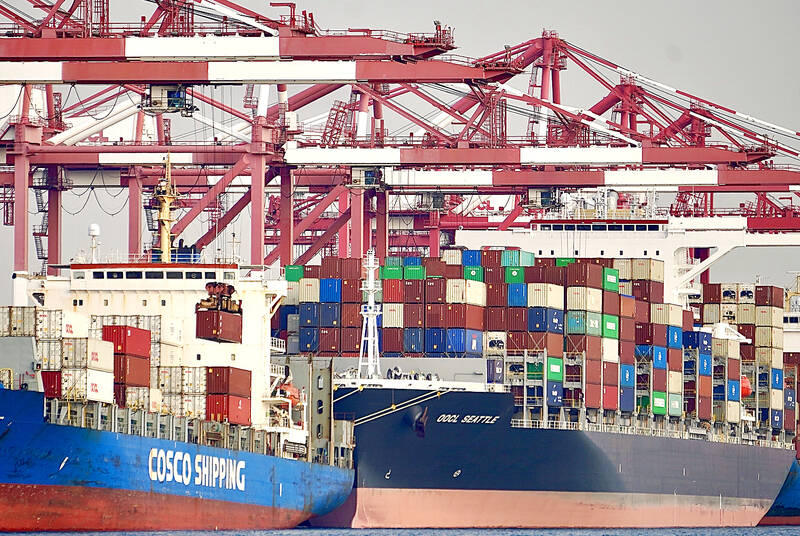Taiwan’s economy expanded 7.64 percent in the third quarter, beating the government’s August forecast by 4.73 percentage points, thanks to surging global demand for artificial intelligence (AI) applications and next-generation technology products, the Directorate-General of Budget, Accounting and Statistics (DGBAS) said yesterday.
The performance marked the fastest quarterly growth in more than a decade and underscored Taiwan’s critical role in global semiconductor and high-performance computing chips supply chains, as companies worldwide accelerate investment in AI and cloud infrastructure.
The strong economic growth last quarter might prompt the agency to raise its full-year forecast, as global banks and local private think tanks have upgraded their projection to more than 5 percent.

Photo: CNA
DBS Bank Ltd (星展銀行) had the most optimistic forecast, expecting the nation’s economic growth to reach 5.6 percent this year.
“Full-year GDP growth is bound to exceed 5 percent” when projections are updated this month, DGBAS senior executive officer Chiang Hsin-yi (江心怡) said.
The official forecast is 4.45 percent.
The government had been conservative in earlier projections due to concerns over US tariffs, geopolitical tensions and other economic headwinds, Chiang said.
However, as trade talks progressed, the tariff scope and rates turned out to be narrower than initially feared, while Washington’s move to exempt US-based investments reduced potential downside risks, Chiang added.
“These developments, combined with strong AI demand and front-loading of orders, contributed to the stronger-than-expected performance,” she said.
Exports rose 36.5 percent year-on-year in the July-to-September quarter, surpassing earlier estimates by 7.4 percentage points, led by strong shipments of advanced semiconductors, AI servers and next-generation smartphones, the DGBAS said.
Overall, external demand contributed 7.21 percentage points to third-quarter growth, accounting for 94 percent of the economic expansion, it said.
Imports also rose sharply, up 24.91 percent, reflecting aggressive capital spending among semiconductor manufacturers and their suppliers.
Imports of capital goods surged by 47.69 percent as chipmakers expanded production capacity and invested in advanced manufacturing equipment.
Domestic demand lagged behind, with private consumption growing 0.92 percent, supported by spending on leisure activities, information technology products, stock trading and outbound travel, partially offsetting weak car sales, and flat restaurant and retail revenue, the DGBAS said.
Consumer spending is expected to pick up following the government’s NT$10,000 cash handouts, officials said.
Government consumption rose by 0.08 percent, contributing minimally to overall growth.
The data highlighted Taiwan’s position as a primary beneficiary of the global AI investment boom, alongside major chipmaking economies such as South Korea and the US.
With semiconductor and high-tech export momentum expected to continue into next year, Taiwan’s growth outlook remains strong, Chiang said, but added that geopolitical tensions, global technology cycle fluctuations and trade policy uncertainties could pose risks.

LIMITS: While China increases military pressure on Taiwan and expands its use of cognitive warfare, it is unwilling to target tech supply chains, the report said US and Taiwan military officials have warned that the Chinese People’s Liberation Army (PLA) could implement a blockade within “a matter of hours” and need only “minimal conversion time” prior to an attack on Taiwan, a report released on Tuesday by the US Senate’s China Economic and Security Review Commission said. “While there is no indication that China is planning an imminent attack, the United States and its allies and partners can no longer assume that a Taiwan contingency is a distant possibility for which they would have ample time to prepare,” it said. The commission made the comments in its annual

DETERMINATION: Beijing’s actions toward Tokyo have drawn international attention, but would likely bolster regional coordination and defense networks, the report said Japanese Prime Minister Sanae Takaichi’s administration is likely to prioritize security reforms and deterrence in the face of recent “hybrid” threats from China, the National Security Bureau (NSB) said. The bureau made the assessment in a written report to the Legislative Yuan ahead of an oral report and questions-and-answers session at the legislature’s Foreign Affairs and National Defense Committee tomorrow. The key points of Japan’s security reforms would be to reinforce security cooperation with the US, including enhancing defense deployment in the first island chain, pushing forward the integrated command and operations of the Japan Self-Defense Forces and US Forces Japan, as

IN THE NATIONAL INTEREST: Deputy Minister of Foreign Affairs Francois Wu said the strengthening of military facilities would help to maintain security in the Taiwan Strait Japanese Minister of Defense Shinjiro Koizumi, visiting a military base close to Taiwan, said plans to deploy missiles to the post would move forward as tensions smolder between Tokyo and Beijing. “The deployment can help lower the chance of an armed attack on our country,” Koizumi told reporters on Sunday as he wrapped up his first trip to the base on the southern Japanese island of Yonaguni. “The view that it will heighten regional tensions is not accurate.” Former Japanese minister of defense Gen Nakatani in January said that Tokyo wanted to base Type 03 Chu-SAM missiles on Yonaguni, but little progress

NO CHANGES: A Japanese spokesperson said that Tokyo remains consistent and open for dialogue, while Beijing has canceled diplomatic engagements A Japanese official blasted China’s claims that Japanese Prime Minister Sanae Takaichi has altered Japan’s position on a Taiwan crisis as “entirely baseless,” calling for more dialogue to stop ties between Asia’s top economies from spiraling. China vowed to take resolute self-defense against Japan if it “dared to intervene militarily in the Taiwan Strait” in a letter delivered Friday to the UN. “I’m aware of this letter,” said Maki Kobayashi, a senior Japanese government spokeswoman. “The claim our country has altered its position is entirely baseless,” she said on the sidelines of the G20 summit in Johannesburg on Saturday. The Chinese Ministry